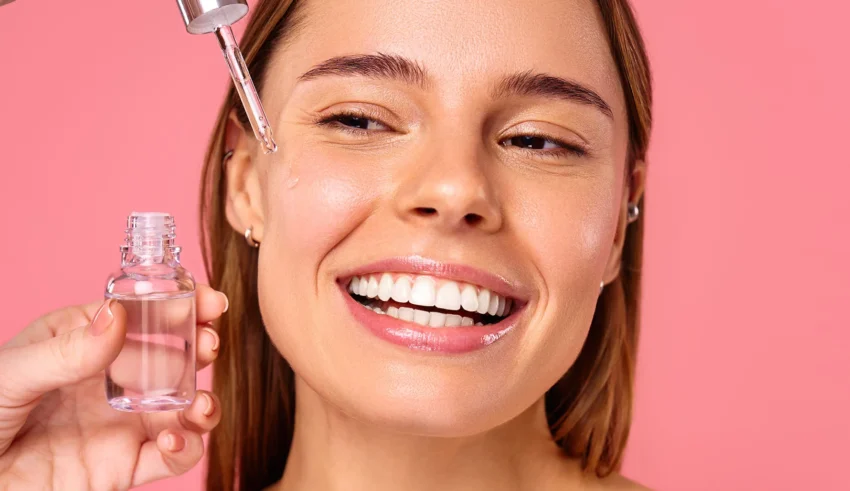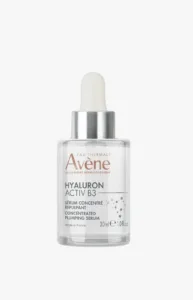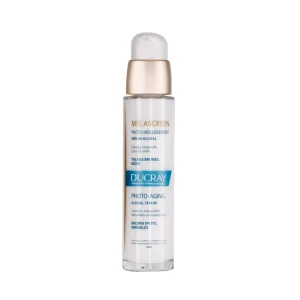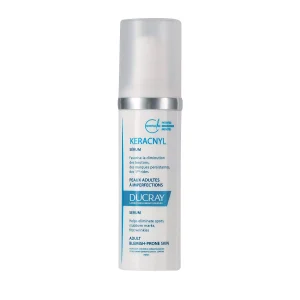
If your skincare routine is well established and you cleanse, tone and moisturize religiously, good for you. But if you’re looking to improve your skin and treat problems at their root, the addition of a facial serum can be very helpful.
In this article from The Dermo Lab, we’ll look at the importance of using a face serum and the benefits that different types of serum can bring to your skin.
What is a face serum?
Face serums have become an essential step in any skincare routine, and have been proven to make a noticeable difference to the look and feel of the skin.
Serums work in a slightly different way to ordinary moisturizers. They contain just a few concentrated active ingredients and fewer additives such as thickeners, emulsifiers or oils, enabling the formula to be absorbed quickly and the active ingredients to penetrate more deeply, delivering a high concentration of effective ingredients directly into the skin.
The high concentration of face serums makes them ideal for targeting specific skin problems, whether fine lines, fatigue or dilated pores. Face serums are designed to be used in combination with a moisturizing cream, rather than in its place.
What are the benefits of facial serums?
If you use a facial serum that’s well suited to the type of problem you’re trying to solve, it can have many benefits.
Let’s take a closer look at some of the main benefits of adding this product to your skincare routine:
- Rapid absorption by the skin. Serums are lighter skincare formulas than moisturizers. The finer viscosity allows the serum to be absorbed more easily by the skin. Facial serums are therefore an ideal first step in the skincare layering process.
- Soothing for sensitive skin. Serums, with their light preparations, are often very suited to sensitive skin.
- Can deliver more visible results. The higher concentration of active ingredients may give more visible results than other types of skin care products.
- Feels light on the skin. Because it is rapidly absorbed by the skin, a face serum does not feel heavy or greasy.
What are the types of serums?
We offer a range of skincare serums for different skin types. Discover here some of the different facial serums available and learn what these powerful formulas can do for your skin.
1- Anti-aging serums
Anti-aging serums generally target a range of age-related skin problems, such as fine lines and wrinkles and loss of elasticity. The choice of formula depends largely on your skin type and the extent of your age-related problems.
Our pick:
Eau Thermale Avène Hyaluron Activ B3 Concentrated Plumping Serum
Its benefits:
- Immediate tension effect thanks to its very high concentration of hyaluronic acid (1.5%)
- Replumps the skin after just 4 hours
- Fixes wrinkles in as little as 2 weeks
2- Moisturizing serums
The main purpose of moisturizing serums is to hydrate, soften and visibly plump the skin. A serum helps replenish dehydrated skin, making it look plumper, smoother and firmer with regular use.
3- Brightening serums
In general, brightening serums are designed to help improve the appearance of dullness, unevenness and other skin tone problems.
Our pick:
Ducray Melascreen Photo-Aging Global Serum
Its benefits:
- Smoothes wrinkles and restores skin density
- Corrects and lightens dark spots
- Combats skin ageing, protects and acts against all signs of photo-aging
4- Exfoliating serums
People who often have dull, lacklustre skin can benefit from adding an exfoliating serum to their skincare routine. These formulas typically contain chemical exfoliants, such as alpha or beta hydroxy acids, to help remove dead surface skin and promote a more radiant appearance.
5- Skin-reinforcing serums
Generally speaking, skin-strengthening serums are formulas that help support your skin’s natural moisture barrier (the integrity of which is imperative for healthy-looking skin). They can help solve a wide range of skin problems and can be used daily to boost skin’s resilience.
Our pick:
Ducray Keracnyl Serum
Its benefits:
- Helps eliminate imperfections and balance the bacterial flora of C. acnes
- Reduces pigmentation marks and scarring caused by acne
- Smoothes the skin and acts against the first signs of wrinkles
6- Eye serums
Eye serums are pretty straightforward: these are serums specially designed for the eye area. Often, they can help resolve specific problems around the eyes, such as dark circles or puffiness.
How to use a serum?
The best way to use a face serum is as a base layer under your heavier products such as moisturizer, sunscreen and make-up.
You can use a face serum once or twice a day after cleansing and toning your skin. Think of it as the next step after cleansing.
How often you should apply a serum to your skin depends on your goals. We offer the following tips to help you determine when to apply a facial serum to your skin.
- Brightening and antioxidant serums are most effective when applied in the morning. This helps protect your skin from environmental aggressors and the production of free radicals produced by light, including UV and high-energy visible light.
- Anti-aging serums are often better suited to night-time application. This allows the ingredients to work with your body’s circadian rhythm for skin repair and renewal.
- Moisturizing serums for drier skin can be applied twice a day to keep skin fresh and hydrated.
To get the most out of a facial serum, we recommend the following tip:
- Apply skincare products from thinnest to thickest. Most serums are most effective when applied as a first layer, in direct contact with clean skin, after the use of a cleanser.
What you need to know
Facial serums are lightweight products containing a high concentration of active ingredients. They are rapidly absorbed by the skin, making them an excellent step after cleansing.
There are many different types of serum, each with its own unique purpose and ingredients. Some serums help brighten skin or reduce imperfections, while others focus on hydration or fighting the signs of aging.
Some serums work best in the morning, while others give better results when applied in the evening. If you’re not sure whether a facial serum is right for you, or what type of serum to use for your skin, consult a certified dermatologist for more information.











